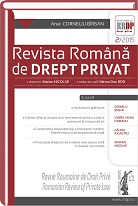Prescripţia dreptului de a obţine executarea silită în dreptul civil român
Statute of limitations for the right to obtain enforcement in the Romanian civil law
Author(s): Marian NicolaeSubject(s): Law, Constitution, Jurisprudence
Published by: Universul Juridic
Keywords: statute of limitations; ius commune; enforceable action; right to obtain enforcement; general term of lapse of time; course of the statute of limitations.
Summary/Abstract: The institution of statute of limitations for the lapse of time constituted the subject matter to which the Romanian lawmaker paid special attention, at the time of recodification of the civil laws, of substantive law and of procedural law. Still preserving the sustainable elements of the previous regulation, the New Civil Code and the New Code of Civil Procedure have improved the lapse of time regime, turning the respective institution into a modern regulation, governed by flexible, transparent and reasonable (commensurate) rules, orders, assuring the harmonious matching of the general interest in the consolidation of the questionable legal relationships with the particular interest in the actual protection of the subjective rights and the particulars’ legitimate interests. De lege lata, ius commune of the lapse of time is composed of the regulations contained in the New Civil Code (mainly, art. 2.500-2.544), applicable both to the right of condemnation action, and to the right of enforceable action (the right to obtain condemnation), and in the New Code of civil procedure (art. 706-711), applicable to the right of enforceable action (the right to obtain enforcement). The right to obtain enforcement is a kind of expression of the right of action from the substantive point of view, and consequently, is different from the right of action from the procedural point of view (the right to refer to the court, the right to claim enforcement etc.). From the point of view of the lapse of time, the right to obtain enforcement in principle is subject to statute of limitations, as compared to the right to obtain condemnation, which may be subject, or not to statute of limitations, as the case may be. The general time limitation period of the right to obtain enforcement is of 3 years, unless otherwise set forth by law (or in the parties’ agreement). Although the law requires that the lapse of time starts upon emergence of the right to obtain enforcement, actually, the beginning of the lapse of time depends on the jurisdictional or non-jurisdictional nature of enforcement: in case of jurisdictional titles, the lapse of time starts when the court order or the arbitral award remains final, whilst in case on non-jurisdictional titles, the lapse of time starts in principle, upon emergence of the right to obtain enforcement. The course of the statute of limitations may be suspended or, as the case may be, interrupted in the special cases set forth by law or by the parties and in case for duly substantiated reasons, the creditor was not able to take any legal actions for the purpose of its interruption, its relief from effects of expiry is possible.
Journal: Revista Română de Drept Privat
- Issue Year: 2015
- Issue No: 02
- Page Range: 117-192
- Page Count: 76
- Content File-PDF

